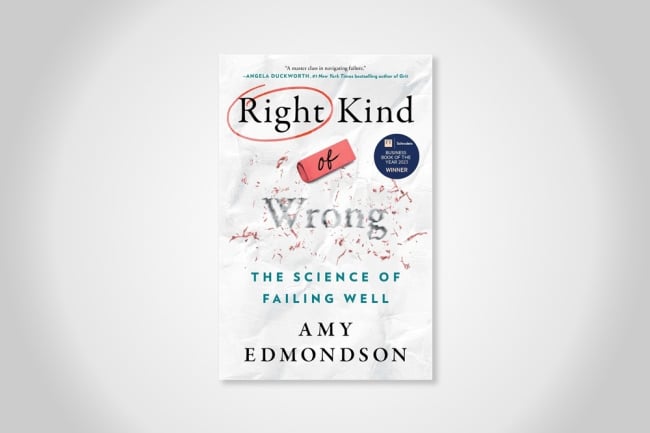You have /5 articles left.
Sign up for a free account or log in.

Simon & Schuster
Right Kind of Wrong: The Science of Failing Well by Amy C. Edmondson
Published in September 2023
In no other career is failure as common as in academia.
A completed dissertation is almost always a Frankenstein-like patchwork of revisions and corrections made in response to reviewers’ (often contradictory) demands.
Conference submissions will be rejected more than accepted. The best result one can wish for in a journal submission is significant rewrites, although most papers will be rejected. University press editors will decline your book proposals.
Your students often fail to attend your lectures, sleep through class and are merciless in their teaching evaluations.
Failure is also ever present for nontraditional academics, alt-acs and nonfaculty educators. Our big initiatives die when the provost leaves and the new one has different priorities. The projects we work on never make it out of the pilot phase.
We find ourselves without a legible career path to greater responsibility and impact at our institutions. As an educator outside the tenure track, we are continuously on the wrong end of the status hierarchy embedded in the postsecondary caste system.
Should all this failure dissuade someone from pursuing a traditional or nontraditional academic career?
If you read Amy Edmondson’s Right Kind of Wrong (and you should), you might feel better about all the future—and past—failures of your academic career.
Edmondson, the Harvard School Business School professor famous for her pioneering research on psychological safety in the workplace, has written a book to help everyone, especially academics, think about their careers.
Right Kind of Wrong begins with the observation that failure is most commonly discussed in unhelpful binary terms. On one end, organizational leaders may claim that “failure is not an option.” In this way of thinking, failure becomes the opposite of success. An alternative framing, made famous in tech culture, is the mantra that encourages us to “fail fast, fail often.”
As Edmondson points out, these failure binaries are not particularly helpful, as neither stresses the goal of learning. If failure is inevitable (as in our academic careers), then we should strive for intelligent failures.
The path to intelligent failure is treating our work and our careers as experiments. Every instance of failure is an opportunity to gather new information, update our hypotheses and recalibrate our methods.
As we move into new territory in our scholarship, teaching and organizational initiatives, we should adopt an attitude of relentless curiosity about what works and what does not.
The worst thing we can do as academics, either as scholars or as campus organizational leaders, is try to avoid failure by restricting our work to narrowly incremental advances. For Edmondson, this is a “playing not to lose” strategy and is seldom effective or satisfying. The push in Right Kind of Wrong for a bias for action should be internalized by every academic at every career stage.
If you are willing to share some of the failures of your academic career and what you learned from them, please reach out. I’d love to do a Q&A with you based on one or more of your intelligent failures.
What are you reading?




